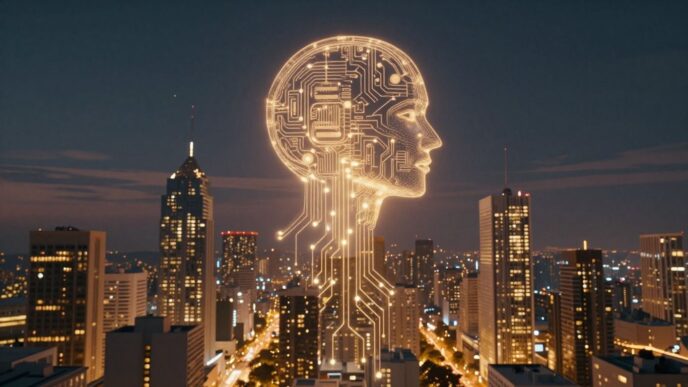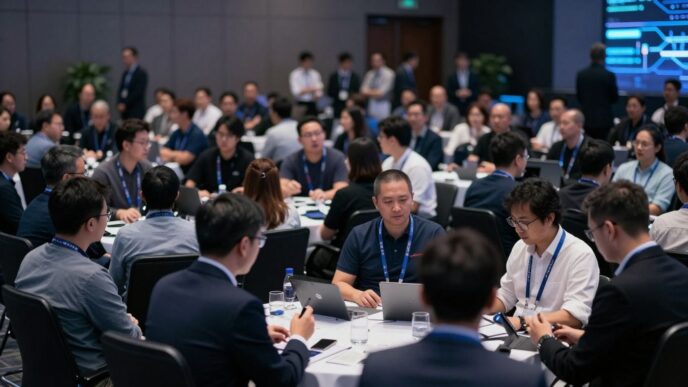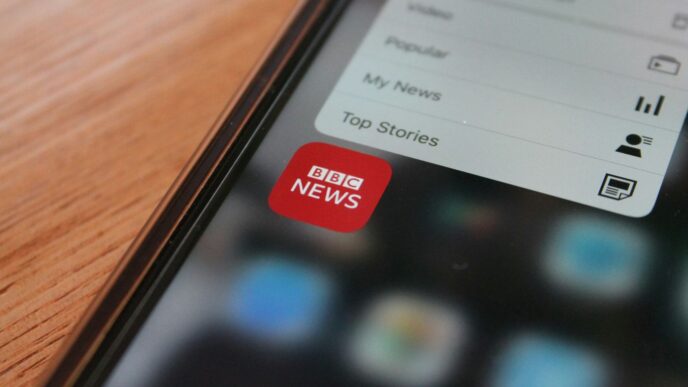The world of work is changing fast, and artificial intelligence is a big reason why. If you’re looking for a job or thinking about your career path, it’s smart to keep up with what’s happening in ai jobs news. We’re seeing a lot of new opportunities pop up, but also some shifts in how companies hire and what skills they’re looking for. Let’s break down what’s new and what you need to know to stay on track.
Key Takeaways
- AI job postings are going up steadily, showing a strong demand across many fields, not just tech.
- Big tech companies and consulting firms are hiring a lot of AI talent, but other industries like healthcare are also getting involved.
- Machine learning engineers are still in high demand, and new roles are appearing in areas like generative AI and computer vision.
- Skills like Python, TensorFlow, PyTorch, and understanding data science are super important for AI jobs, alongside problem-solving abilities.
- AI is changing how companies hire, making things faster but also bringing up questions about fairness and bias in the process.
The Accelerating Demand For AI Jobs News
It’s pretty clear that jobs related to artificial intelligence are on the rise. We’re seeing a steady climb in the number of openings, which tells us companies are really investing in AI. This isn’t just a small trend; it’s a significant shift in how businesses operate and what they need from their employees.
AI Job Postings Show Consistent Upward Trajectory
The numbers don’t lie. Throughout 2024, the number of AI job postings kept going up. While there might be some seasonal dips, the overall direction is a clear increase. This suggests that AI is becoming a standard part of many companies’ plans, not just a side project. Businesses are looking for people who can help them use AI to work smarter, whether that’s by improving how they manage their supplies or how they interact with customers. It’s a busy time for recruiters trying to find folks with the right mix of coding know-how and practical AI application skills.
Tech Giants Lead The Charge In AI Hiring
Big names in tech, like Amazon, Google, and Microsoft, are at the forefront of this hiring push. They’re posting a lot of jobs that require AI skills, showing they’re serious about building out their AI capabilities. It’s not just the tech companies, though. Consulting firms are also actively looking for AI talent. This shows that AI is spreading beyond just software development and into areas where companies need advice on how to use these new tools effectively.
Consulting Firms Embrace AI Talent Acquisition
Companies like Accenture and Deloitte are also making big moves in AI hiring. They’re not just hiring AI experts for their own internal use; they’re also bringing in talent to help their clients navigate the world of AI. This indicates that the need for AI expertise is becoming widespread, and professional services firms are stepping up to meet that demand. They understand that helping businesses make sense of AI and implement it well is a growing area of business.
Key AI Job Trends Shaping 2025
Alright, so what’s actually happening with AI jobs as we head into 2025? It’s not just about coding anymore, though that’s still a big part of it. We’re seeing some really interesting shifts that are changing what companies are looking for and what people are doing.
Machine Learning Engineers Remain Top In Demand
If you’re looking at AI jobs, Machine Learning Engineer is still the name you see most often. Think of them as the architects of AI systems, building and refining the models that make AI work. Companies are hiring these folks like crazy because they’re the ones who can actually make AI do what we want it to do, whether that’s predicting customer behavior or figuring out complex data patterns. It’s not just about having a degree; it’s about knowing how to build and train these systems effectively.
Emerging Roles In Generative AI And Computer Vision
Beyond the core ML roles, things are getting more specialized. Generative AI, the tech behind tools like ChatGPT, is really taking off. This means new jobs are popping up for people who can work with these creative AI tools. We’re talking about roles focused on content creation, design, and even problem-solving using AI that can generate new things. On top of that, Computer Vision is another hot area. These are the AI systems that can ‘see’ and interpret images or videos, which is huge for everything from self-driving cars to medical imaging. So, if you’re into making AI understand the visual world, this is a big opportunity.
The Rise Of Remote AI Training Specialists
Here’s a trend that’s a bit different but super important: Remote AI Training Specialists. As AI models get more complex, they need constant training and fine-tuning. This often involves humans reviewing outputs, correcting errors, and providing feedback. The demand for people who can do this remotely is growing because it’s a task that can be done from anywhere. It’s a role that requires attention to detail and a good grasp of how AI works, even if you’re not building the models from scratch. It shows that even with advanced AI, human input is still very much needed.
Essential Skills For The AI Job Market
So, you want to get into the AI job scene? That’s cool. But what do you actually need to know? It’s not just about knowing fancy terms. You’ve got to have some real skills. Think of it like building something – you need the right tools and know-how.
Python, TensorFlow, And PyTorch Dominate Skill Sets
When you look at job postings, certain programming languages and tools pop up again and again. Python is a big one. It’s like the Swiss Army knife for AI developers because it’s flexible and has tons of libraries. Then there are the big frameworks like TensorFlow and PyTorch. These are what you use to build and train those complex AI models. If you’re serious about AI development, getting comfortable with these is pretty much a must. It’s where the rubber meets the road for a lot of AI projects.
Natural Language Processing And Data Science In Focus
Beyond just coding, you need to understand how AI works with language and data. Natural Language Processing, or NLP, is huge. It’s how computers understand and generate human text – think chatbots or translation tools. Data science skills are also super important. This means knowing how to collect, clean, and make sense of large amounts of information. AI models are only as good as the data they’re trained on, so being able to handle that data well is key. It’s about finding patterns and insights that humans might miss.
Soft Skills Complement Technical AI Expertise
Now, it’s not all about the code and the math, believe it or not. While your technical skills get you in the door, your people skills help you succeed. Being able to explain complicated AI ideas to folks who aren’t tech experts is a big deal. Projects often involve different teams, so working well with others is a must. And honestly, creativity and good problem-solving are still super important. AI can do a lot, but it needs humans to guide it, fix it when it breaks, and think of new ways to use it. Adaptability is probably the most important thing; the AI field changes so fast, you have to be ready to learn new things all the time.
Industry-Wide Adoption Of AI Talent
It’s not just the big tech companies anymore. AI talent is popping up everywhere, and honestly, it’s pretty wild to see how fast it’s happening. We’re talking about industries that you might not immediately think of when you hear ‘AI’, but they’re jumping in with both feet.
Healthcare And Management Consulting Embrace AI
Think about healthcare. AI is starting to help doctors with diagnoses, sort through patient data, and even speed up drug discovery. It’s a big deal for patient care. Then there’s management consulting. These firms are using AI to analyze business problems, predict market trends, and give their clients better advice. It’s like they’re giving their consultants superpowers.
Staffing And Recruiting Firms Actively Hire AI Professionals
Even the companies that help other companies find people are getting in on the AI action. Staffing and recruiting firms are hiring AI pros for themselves, and they’re also looking for AI talent for their clients. This shows just how widespread the need is. It’s not just about building AI; it’s about finding the people who can build, manage, and use it effectively.
AI’s Far-Reaching Influence Across Sectors
Basically, AI is becoming a tool that almost every sector can use. From making factories more efficient to personalizing customer experiences, AI is finding its place. This means the demand for people who understand AI isn’t going away anytime soon. It’s becoming a standard skill, like knowing how to use a computer used to be.
Global Shifts In AI Hiring Landscapes

The way companies are looking for AI talent is changing, and it’s not just happening in a few places anymore. While the United States is still a big player, other countries are stepping up. It’s a global game now, and where you look for AI jobs might surprise you.
United States Leads Global AI Job Market
The U.S. continues to be a powerhouse for AI jobs, especially in the tech sector. A lot of new AI job postings come from here, showing that the country is still at the forefront of AI development and use. Think of all the innovation happening in places like Silicon Valley and other tech hubs; they’re driving a lot of this demand. This strong position means a lot of opportunities for those with AI skills in the U.S. AI job postings have seen a big jump.
Poland Emerges As A Standout European AI Hub
While the U.S. is leading, keep an eye on Poland. This European country has seen a really impressive increase in AI job openings lately. It’s becoming a notable spot for AI talent in Europe, which is great news for the region and for companies looking to hire there. This growth suggests that AI is spreading beyond the usual tech centers and creating new opportunities in different parts of the world.
Evolving Geography Of AI Talent Demand
The demand for AI professionals isn’t staying put. We’re seeing a shift in where companies are looking to hire:
- United States: Remains the top market, particularly in tech. Expect continued high demand here.
- India: Holds a significant share but has seen some cooling in hiring intensity recently.
- Poland: A rising star in Europe, showing rapid growth in AI job postings.
- Other Markets: Various other countries are also increasing their AI hiring, indicating a more distributed global demand.
This changing map means that job seekers and companies alike need to pay attention to where the opportunities are popping up. It’s a dynamic landscape, and staying informed about these global shifts is key to staying ahead.
Navigating The AI-Powered Hiring Process
The way companies find and hire people is changing fast, thanks to AI. It’s not just a futuristic idea anymore; AI is now part of how jobs are advertised, how applications are looked at, and even how interviews are analyzed. For anyone looking for a job, figuring out how AI is changing things and getting ready for it is pretty important if you want to keep up.
AI Revolutionizes Candidate Sourcing and Screening
AI tools can now sift through thousands of resumes in minutes, way faster than a human ever could. This means companies can look at a much bigger group of potential hires, not just the ones who happen to live nearby or know someone inside. It’s like casting a wider net, and it helps find people with the exact skills needed for a role. This is a big shift from how things used to be done, where your network often played a huge part. Now, with AI helping to match skills to jobs, the playing field is a bit more level globally.
Automation of Repetitive Recruitment Tasks
Think about all the time recruiters spend on tasks like scheduling interviews, sending out initial emails, or even doing basic resume checks. AI can handle a lot of that now. Chatbots can answer common questions from applicants, and AI can sort resumes to flag the most promising ones. This frees up human recruiters to focus on more important things, like talking to candidates, assessing their fit for the company culture, and making the final decisions. It’s a change in their role, moving from being gatekeepers to more like guides.
Addressing Bias and Ensuring Fairness in AI Hiring
While AI can speed things up, there’s a big concern about fairness. AI systems learn from data, and if that data has old biases in it, the AI can end up making unfair decisions. For example, an AI might unintentionally favor certain groups of people over others based on past hiring patterns. It’s a tricky problem. Companies are working on ways to check these AI tools for bias and make sure they’re treating everyone fairly. It’s a balancing act between using AI’s power and making sure it’s ethical. Here are a few things to keep in mind:
- Understand the Tools: Try to learn how the AI hiring tools work. What kind of information do they look for? Knowing this can help you present your qualifications in the best way.
- Highlight Human Strengths: AI is good at spotting patterns, but it’s not great at creativity, complex problem-solving, or emotional intelligence. Make sure your application and interview answers show off these human qualities.
- Ask About Fairness: If you’re applying to a company that uses AI in hiring, don’t be afraid to ask about their process and how they work to prevent bias. Transparency is key.
- Keep Learning: The AI landscape is always changing. Staying updated on new AI tools and trends will help you adapt your job search strategies.
The Future Of Work In The Age Of AI
It’s easy to get caught up in the headlines about AI taking jobs, but the reality is a bit more complicated. Think of it less like a robot uprising and more like a really big software update for pretty much everything we do. AI is set to change how we work, not necessarily eliminate work itself. Reports suggest that by 2050, a huge chunk of current jobs will need some serious adjustments because of AI. It’s not just about jobs disappearing; it’s about them transforming.
AI Drives Job Transformation, Not Just Replacement
So, what does this transformation look like? Well, AI is getting really good at handling repetitive tasks. Things like sorting through tons of data, scheduling meetings, or even drafting basic reports are becoming automated. This means jobs that are mostly made up of these kinds of tasks are going to change a lot. For example, administrative roles might shift from doing the task themselves to managing the AI that does the task. It’s a shift from doing to overseeing.
- Automation of Routine Tasks: AI excels at repetitive, predictable work. This frees up human workers for more complex problem-solving.
- Augmentation of Human Capabilities: AI tools can help professionals perform their jobs better and faster, like a super-powered assistant.
- Creation of New Roles: As AI technology develops, new jobs emerge in areas like AI system management, ethics, and specialized AI development.
Adaptation And Lifelong Learning Are Crucial
Given this shift, staying put and doing things the old way isn’t really an option anymore. The most important thing for anyone looking to stay relevant in their career is to keep learning. This isn’t just about getting a new degree; it’s about constantly picking up new skills and adapting to new tools. Think of it as a continuous process, not a one-time event. The pace of change means that what you know today might be outdated in a few years, so being open to learning new things is key.
Here’s a look at how jobs might evolve:
| Job Category | Current State | Future State with AI |
|---|---|---|
| Data Entry | Manual input of information | Automated data capture and validation by AI systems |
| Customer Service | Human-led support, answering common queries | AI chatbots handle initial queries, human agents focus on complex issues |
| Content Creation | Manual writing and editing | AI assists with drafting, research, and editing; humans focus on strategy and creativity |
| Financial Analysis | Manual data crunching and report generation | AI performs complex analysis and generates reports; humans interpret and strategize |
Generative AI Creates New Creative Opportunities
It’s not all about efficiency and automation, though. Generative AI, the kind that can create text, images, and even music, is opening up entirely new avenues for creativity. Artists, writers, and designers are finding new ways to use these tools to explore ideas and create things that weren’t possible before. It’s like having a new set of brushes or a new instrument to play. This technology can help overcome creative blocks and speed up the ideation process, leading to more innovative outputs. The future of work isn’t just about adapting to AI; it’s also about finding new ways to be creative and productive with it.
Wrapping Up: What’s Next in AI Jobs
So, looking back at the year, it’s pretty clear AI isn’t just a buzzword anymore. Big companies like Amazon and Google have been hiring tons of people for AI roles, and it’s not just tech firms – places like Deloitte are looking for AI smarts too. We saw a steady climb in job openings, showing AI is becoming a regular part of how businesses work, from making things run smoother to helping customers. Yes, some jobs might change as AI takes over repetitive tasks, but it’s also creating new kinds of work, especially in designing and managing AI systems. The key takeaway? Keep learning. Whether it’s coding, understanding new AI tools, or just getting better at problem-solving, staying curious and picking up new skills is the best way to keep up. The job market is changing fast, but with the right approach, you can definitely stay ahead of the curve.














